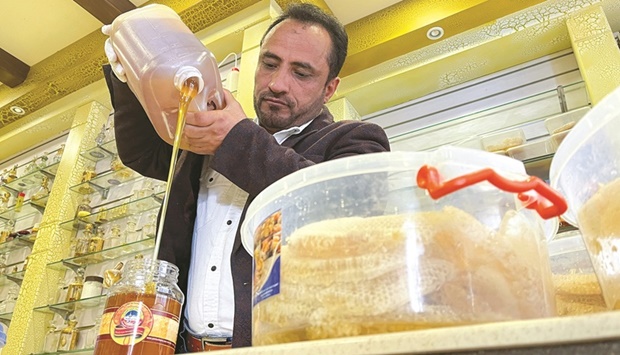Idrees al-Haddad used to buy seven kilogram tubs of Yemen’s world-famous honey when he went shopping.
Today he can only afford 1kg.
Like many Yemenis suffering the extreme inflation and salary losses of a seven-year war, Haddad’s reduced consumption has left the industry with a production surplus.
“Merchants used to come to us to buy honey from our houses, from the valley apiaries. Nowadays we go to the market — but there isn’t demand!” said beekeeper Amin Hussein amid his insects at Wadi Dhahr, in Sanaa province. The bees crawl and buzz around cabinet-like wooden hives, feeding on almond tree flowers. In the capital Sanaa, shopkeeper Faris al-Houri said honey prices have fallen 30-40% from last year, when prices were already low.
“Border crossings are closed, shipping and export have stopped....Demand is non-existent,” Houri said, adding that people can barely afford food, never mind honey.
In Sanaa’s upmarket honey shops vendors scoop up the light, dark, clear and opaque honeys reputed for their taste and medicinal properties.
They tease the viscous liquids around spoons for customers to try. “Our commercial trade has almost halted,” said vendor Helmi al-Marhebi.
Yemen’s honey industry faces many challenges. Frontlines, landmines and fuel shortages hamper farmers transporting colonies to feed on seasonal plants. Climate change is also seen as a problem.
Abdullah Yarim, chairman of an industry organisation, said war has reduced access to markets in wealthy Gulf states.
Saudi Arabia, which leads a pro-government coalition fighting the Houthis who control Sanaa and northern Yemen, maintains an air, sea and land blockade on Houthi territory.
Import packaging standards also constrain exports, Yarim said. In the United Arab Emirates, a regional trade hub and coalition member, 1kg of top-end Yemeni Sidr honey can retail around 2,000 AED ($545).
Haddad paid just 30,000 Yemeni riyals ($50) for his 1kg of Sidr honeycomb.
“No Yemeni house used to lack honey,” lamented customer Ibrahim al-Sanafi.

Vendor Abdullah Yarim pours honey into a glass bowl at his shop in Sanaa, Yemen.
